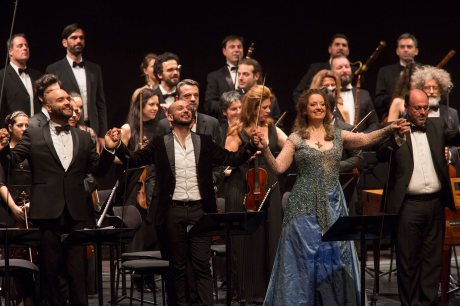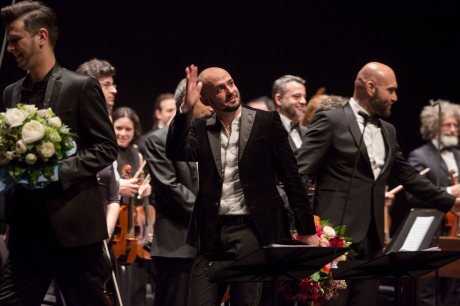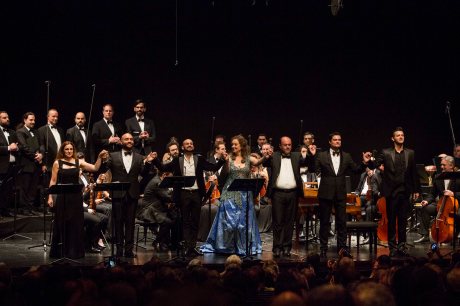O, she doth teach the torches to burn bright!
It seems she hangs upon the cheek of night
Like a rich jewel in an Ethiop’s ear;
Beauty too rich for use, for earth too dear!
Or,
Ah mi volge i suoi bei lumi!
The problem with experiencing Shakespeare in other idioms, other languages, for those with any familiarity with the original works, is the loss of the English poetry which it inevitably entails. While this is perhaps less pressing in for instance the history plays, it is a loss more deeply felt in the archetypical romantic drama of Romeo and Juliet. One hopes that it might be compensated by equally lyrical language, be it text or music, but this virtually lost work by Zingarelli bears little of the sensibility of the original. The above fragment seems to be the only line where Romeo actually describes his beloved; most of the time he is complaining about the injustice of it all. In terms of the plot, there is no balcony scene and no consummation of the intense feelings of the lovers, which makes the opera feel like it’s missing its core. This obscure opera does have its moments however, and was much helped by a riveting performance.

Giulietta e Romeo 14.5.2016 Xavier Sabata, Franco Fagioli, Ann Hallenberg
This was part of the Salzberg Whitsun Festival which is presided over by the formidable Cecilia Bartoli. This year’s theme was indeed “Romeo and Juliet”, and, as well as the work under review, included a performance of West Side Story (which of course unashamedly ditches sixteenth century poetry for a mid-twentieth century setting), starring La Bartoli as Maria, a performance of Prokofiev’s ballet, some movie versions of the play and some appropriately themed concerts.
Nicola Antonio Zingarelli (1752-1837) of Naples is, due as much to his longevity as anything else, something of a link between such late 18th century opera composers as Paisiello and Cimaroso, and the bel canto canon of Rossini, Donizetti and Bellini. He was immensely popular in his own lifetime, but has fallen into almost total obscurity since, his work overtaken by that of Rossini and his student Bellini in particular. A few arias have found their way onto recorded recitals and samplers in recent years, notably and most relevantly Ann Hallenberg’s Arias for Luigi Marchesi.
Giulietta e Romeo premiered at La Scala in 1796 and continued in the Italian repertoire for over 30 years. The libretto was some removes from the original play, being prepared by Italian librettist Giuseppe Maria Foppa, based on a previous French adaptation. As well as the plot variations mentioned above, many of the original characters were left out or elided with others. Tybalt and Paris were merged into Teobaldo, whom Giulietta’s father was determined she should marry, Gilberto was an amalgam of Friar Laurence and Mercutio, and the “silly old fool of a nurse” did not appear at all. A new persona was introduced, Matilde, a confidante of Giulietta. This all led to quite a short work, with a heavy concentration on the role of the suffering Romeo, especially in the third act.

Giulietta e Romeo 14.5.2016 Franco Fagioli
The role of Romeo was created by one of the last of the celebrated castrato singers, Girolamo Crescentini. He composed, or re-composed, the aria “Ombra adorata, aspetta”, possibly the best known piece in the work, which can be heard sung by soprano Deborah Riedel on an extremely miscellaneous CD collection of arias led by Richard Bonynge, entitled Cherry Ripe. Crescentini, of course, came towards the end of the reign of the castrati in the operatic world, and in succeeding performances of the opera the role of Romeo was taken over by such as Malibran and Pasta. Giulietta was sung by mezzo-soprano/contralto Giuseppina Grassini, who seems to have had a successful career after a false start, and to have garnered fame for her liaisons with Wellington and Napoleon, among others; she was also a teacher of Giuditta Pasta.
Given the time range of its original life on the stage, the permutations of singers and circumstances, it is not surprising that there are a number of variations of the opera. For its first modern performance, the version chosen is the original of 1796, with a few numbers from later versions. Without being familiar with any versions at all, it is impossible to assess how this might affect the performance or reflect its original presentation(s).
The composition of the orchestra in this performance seemed to look back to an earlier time again. Conductor George Petrou is perhaps best known for his Baroque interpretations, including several celebrated Handel recordings. Here he led his regular orchestra, Armonia Atenea in what could be considered a somewhat baroque style performance, with a relatively small number of players with what appeared to be earlier 18th instruments. The overture was quite a jolly affair, heavy on the timpani, which you would not have automatically associated with Romeo and Juliet. Overall, the playing of the orchestra was sensitive, sinewy and more transparent than is the usual case with music of the period. As well as definite Baroque touches, one also heard echoes of both Mozart and Rossini in the orchestral passages. Another throwback to an earlier time was the lack of low voices in the cast.
After the overture came a coro, the first of many, sung by an excellent male voice choir, which seems to be part of Armonia Atenea. We then speed through the plot, plunging into the celebration of Giulitta’s impending nuptials with Teobaldo, when it seems she has already fallen for Romeo and is resisting the plans of her father, known here as Everardo, for her hand, and upsetting him considerably.

Giulietta e Romeo 14.5.2016 Dilyara Idrisova, Xavier Sabata, Franco Fagioli, Ann Hallenberg, George Petreo, Bogdan Mihai
Mezzo-soprano Ann Hallenberg as Giulietta appeared early in the piece, in a spectacular blue frock, and a large bejewelled cross, drawing attention to the good Catholic upper class girl aspect of the character (and who here remains virtuous throughout). The tessitura of the role is quite high, especially given Grassini’s comtemporary description as a contralto, but this holds no problems for Hallenberg in her current brilliant vocal estate. As well as providing gleaming high notes throughout, she produced unforced natural sounding singing with accuracy, flexibility and power, and with her usual close attention to text she imbued the character with right amount of girlish naivety at the start, and a more mature sense of tragedy at the end. It is a pity she has no major concluding aria as a more adept composer would surely have provided.
Romeo was sung by Argentinian Franco Fagioli, one of the most popular countertenors of recent times. He is certainly one of the more consummate performers on the operatic stage, mostly in Baroque repertoire as might be expected. He singing is also powerful, accurate and flexible with a considerable range, but there is something odd about his voice production. His voice has a very glittery sheen, which seems to be due to a fast vibrato, unusual amongst countertenors, but which many find very attractive. He was certainly up to all the nuances of Zingarelli’s score, particularly the musical demands and high drama of the last scene. He also managed some of his familiar ‘show pony’ mannerisms, hanging out at the back of the stage instead of sitting on the side like everyone else to highlight his solo entrances.
The rest of the cast provided solid support. Mathilde was sung by a Petrou regular, Irina Karaianni, a mezzo-soprano; the role was originally scheduled to be sung by Russian soprano Dilyara Idrisova, so impressive in Alessandro at Bad Lauchstädt last year; it’s not clear what this means. Is there an alternative soprano version perhaps? In any case, Karaianni sang with warm tone and somewhat heavy vibrato, sounding more robust as the evening progressed. Handsome young Romanian tenor Bogdan Mihai was, rather ironically, Everardo, singing with nice unforced tone. Another tenor, Juan Sancho, was impressive as Teobaldo, with good ringing notes, but sadly dead by the end of Act I. Finally, countertenor Xavier Sabata, also more familiar from the Baroque scene was Gilberto; he has a very nice quality to his voice but it is rather soft-grained and did not always manage to surmount the orchestral forces.
One can only speculate on the likelihood of this work entering the regular operatic repertoire. Would a decent staging remedy some of its obvious dramatic deficiencies, or just show them up? It would probably help not to think of it as Romeo and Juliet, but some other pair of star-cross’d lovers. The music is rather nondescript, although that might be due to lack of familiarity not only with Zingarelli but with the rather ill-defined period from which it emanates, but it did seem as though this was a piece being artificially elevated by its bootstraps at the hands of an outstanding cast of singers and musicians.
4 stars
Sandra Bowdler
(Photos : Silvia Lelli)
[…] Hallenberg for 18th century repertoire mezzo lovers (check out this very positive and timely review of her recent performance in Zingarelli’s Giulietta e Romeo […]
Thank you for this review! I was there and I wrote my own here:
where, as you can see, I pretty much agree with your take. I found the orchestra very heavy, though. Very interesting evening anyway.